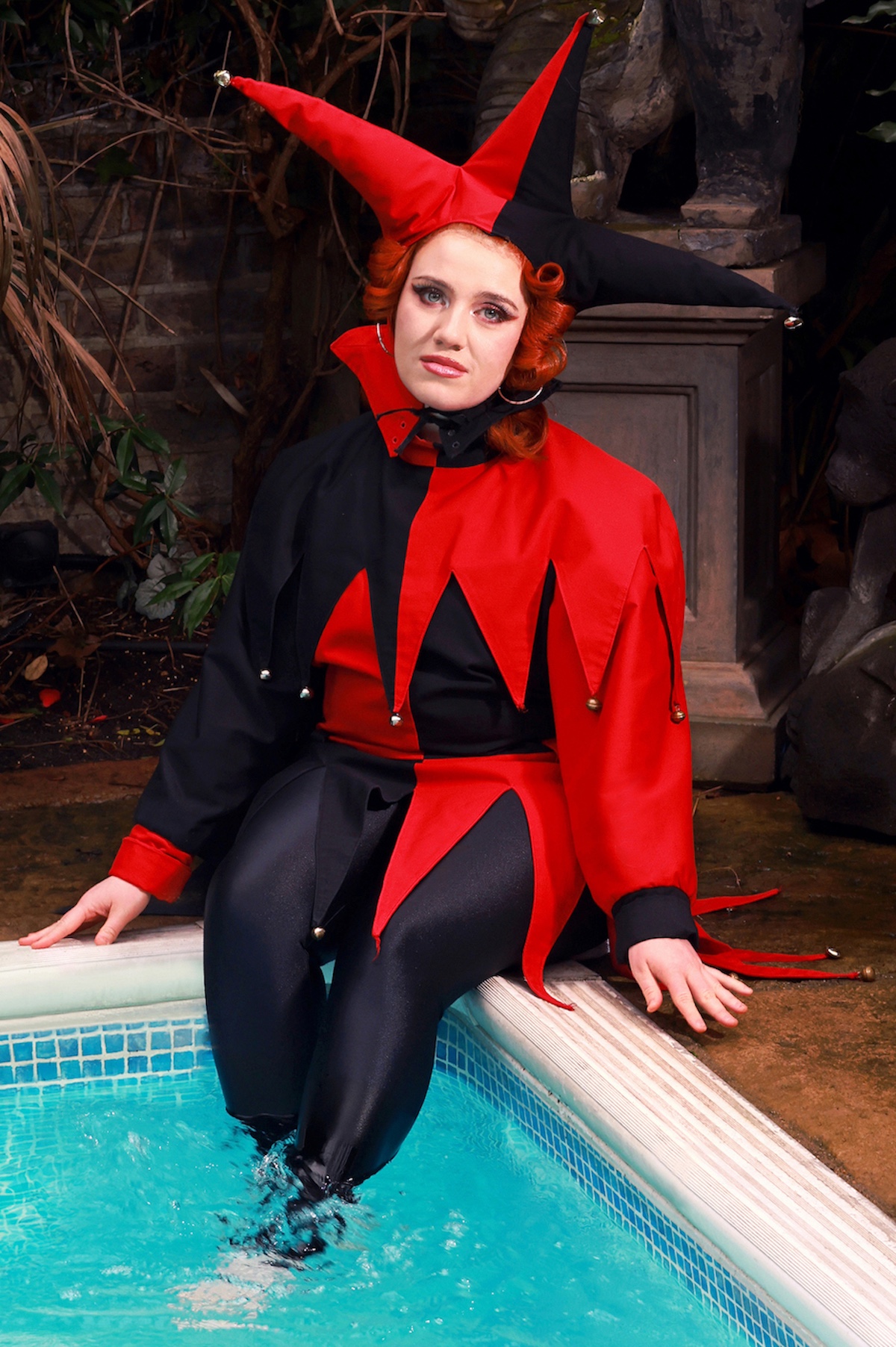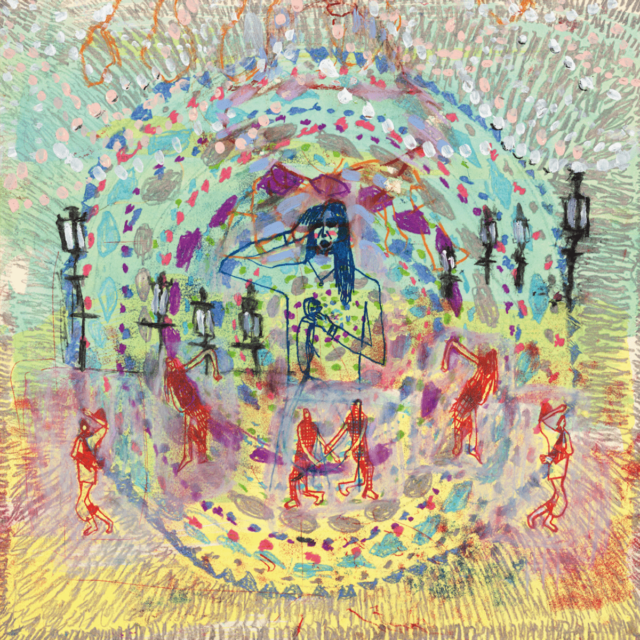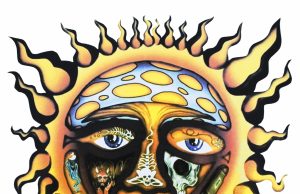THE EDITED PRESS RELEASE: “There’s CMAT and then there’s Ciara. CMAT is just big Ciara: A very, very, very confident version of me. And who is the most competent person in the world and has never done anything wrong in her life, I will never accept that she’s ever done anything wrong,” explains the charismatic, characterful 27-year-old Ciara Mary-Alice Thompson, otherwise known as CMAT. In either guise, her offbeat view of the world and gags she makes without missing a beat fill any and every room she’s in. “I don’t do the pop star thing all the time, because that’d be insane and make you go crazy, right?”
When she is doing the popstar thing, CMAT is vibrant red curly hair, coloured dresses, volume and drama with a western-flair. She is giving an incomparable show that reviewers have described as having “unbridled rockstar energy” and given five-star reviews. But her upcoming second album CrazyMad, For Me takes popstar CMAT through a reinvention of what came before: This is the grand statement of an ambitious mature sound, a textured sonic feel and details of a complex emotional and metaphorical landscape. Or as CMAT puts it: “It’s an abstract breakup album… about what happens when you are still angry about something that happened 10 years ago.”
The concept album is about a 47-year-old woman — an alternate CMAT — 20 years from now. She learns how to build a time machine off YouTube to go back in time to save herself from entering into a relationship so bad it ruined her life. Since it’s built via YouTube, it’s a poor piece of machinery and malfunctions, forcing her to spend between five and 50 years in a time desert. Eventually she crash-lands in 1890s Paris, with no electricity and rudimentary commodities. “So she’s kind of ruined her own life by trying to save what could have been — but she decides to just go with it,” explains CMAT.

It’s split into three sections, which had initially been marked by interludes but now is just “12 bangers straight down… The first section was basically just being angry: ‘This guy fucking sucks, I hate him.’ The second bit of the album’s like: ‘Wait, what if I have actually done something wrong in my life? Crazy concept.’ The second section is me reckoning with myself. And then the third section is about just accepting that the bad stuff has happened and moving on and having fun making friends.”
The storytelling doesn’t sound like anyone else’s — it’s bombastic, grand, full of hooks and picture-painting lyrics projected by her singular vocals — but if you had to take a stab: It’s the mainstream indie she loved as a teenage Bombay Bicycle Club obsessive filtered through 20th-century country music, amplified by knowledge of ’80s and ’90s pop hits with a slide guitar and a camp twist.
“This is music made by a queer Irish person: It’s just gonna have to be funny,” CMAT says of the humour at the heart of her songs. “I feel like a lot of my sense of humour comes from the gays because I’ve never met a gay person that isn’t traumatised on some level. Then you can’t just be traumatised all the time. Because that’s miserable. It’s so boring and so annoying. I think that’s a real Irish thing as well: We’re at a funeral but this is the funniest thing I’ve ever seen. Maybe funeral humour is the way to describe it.”
That sensibility was also born from being a lonely teenager who spent all their time in north Dublin “indoors” and couldn’t find friends she related to in real life so she turned to the internet and ran indie fan accounts. The “instinctive nerdiness” of those years fed into how she writes her music today. Her love of country evolved from an even earlier age; it’s a genre CMAT maintains feels inherently Irish.

“I have a distinct memory of being six or seven and knowing exactly who Johnny Cash was and everything about him and then not knowing who Beyoncé or ABBA or The Beatles were,” she recalls. “If anything is inherently old looking or old sounding, I’m like, ‘That fucking rules.’ And country music is old. You can trace it back to exactly where it comes from. It was maybe the first genre in America that had really prominent female songwriters in it. Women were writing and singing their songs for women and about women.”
She debuted with her 2022 Irish No. 1 album, the Choice Music Prize winner If My Wife New I’d Be Dead, whose music was described as mournful yet accessible, emotionally literate and cleverly crafted, with a huge sense of humour. Take breakout moment Every Bottle Is My Boyfriend as a key example: The ’00s indie-influenced narrative-led banger is about going out, getting drunk and hilariously lamenting everything that’s gone wrong to lead her to this point. “What I’ve always tried to do is make things that are very difficult and complicated to explain and to access, accessible, by putting them into a pop or country song,” CMAT says. “I do that while not bowing to the standards of what is supposed to be accessible today. Because I think accessible music is just music that is really fun and pleasing to listen to and beautiful. It doesn’t have to get onto BBC Radio One. It can not be mixed within an inch of its fucking life. It can still sound cool.”
Unlike her debut, which was a collection of songs she’d spent her life writing, CrazyMad, For Me, produced by Matias Tellez (Girl In Red, Aurora), is entirely new and returns to the past: The difficult relationship she weathered between the ages 17 to 23, one that she says “could have ruined my life and definitely nearly did — but it didn’t!”

“All of the songs on the first record had nothing to do with that time, or that period, or anything to do with him. Because I just was like, I’ve established myself first, and then I’ll go in, I’ll do the hit record. And when I say hit, I don’t mean like a smash hit. I mean, it’s a diss track across an entire record,” she says with a laugh. When she started writing CrazyMad, For Me, she envisioned an anonymous exploration of the relationship, one that avoided specifics and reflected on forgiveness and acceptance. “The deeper I got into it, I got so angry. I’m still fucking angry about all that shit that went down.”
Enter the time desert, where you’ll find references to classical futurism, Hugette Caland drawings and fashion editorials from the ’70s classical futurism revival. On the cathartic opener California, her voice borders on sad and mad over smooth, lightly mournful sonics as she promises to escape to the sunny state or metaphorically away from her life. Next comes the dramatic single Phone Me, a knowing promise to her ex that “I’m crazy but I’m never wrong.” Across guitar-led contemplations Such a Miranda and Rent, we learn more of the toxicity of the relationship and the pen the singer found herself hemmed into. “I found lashes on the DVD case / You said they were mine / Said they were mine / Never my style but / I didn’t wanna get on your wrong side,” she remembers on the latter.
By the swirling Kate Bush-esque sonic theatrics of I…Hate Who I Am When I’m Horny and the country twang of Torn Apart, she comes to terms with her lot and her own complicity in it. “Knew you were bad for me / Fulfilled the prophecy that I created / ‘Cause I wanted some attention”, she sings tempestuously on Torn Apart. The happily unhappy ballad and lead single Whatever’s Inconvenient, sees her address her unhelpful pull towards falling in and out of relationships and on shimmering and cinematic Stay For Something she understands that she chose to stick around despite her ex’s faults.

The focus on one specific romantic relationship and its interior creates a vivid world, one that shows the power of allowing yourself to feel your feelings, be angry and grieve. “It’s acceptable if I do it, because I’m an artist,” CMAT says of staying in the past. “But I have friends that have gone through a breakup and after a month, they will stop talking about it. They’ll be like, oh yeah I’m fine. And it’s because they don’t want to seem like they’re whinging. But you can be upset about something forever. And that’s fine. You should be allowed to be.”
To complement that processing, you’ll hear the influence of Gram Parsons, The Cure, Celine Dion, Jim Steinman and Todd Rundgren blend into something cohesive and moving among the swelling key and tempo changes. “My intention going into this album musically, because of the theme and what we’re talking about, I was like, I want to make a Meat Loaf album, I want to make a Bat Out Of Hell but for the girls,” she says. “Matias said, ‘I kind of want to do that but I also kind of want to make a psychedelic country record.’ I thought those two things could meet, we could do both.”
On the first ever mid-tempo indie bop you’ve heard that features fiddles — Have Fun — CMAT tells herself and the listener to just get on with it (“silly bitch — woo!”). “I just wanted strings all over everything, because I love drama,” she grins. “And the notions of that and all the things that are tied in with that is the whole album right? It’s like, are you being wingebag? Are you being moany?” That emotional breath is central to the beauty of the project — it’s deliciously performative but deeply, deeply real. And that had a purpose: “I wanted to make this for me.”
Complex, intimate and with influences far-flung across time and place, it’s an instant classic album that will attract the broadest audience. But CrazyMad, For Me, like If My Wife New I’d Be Dead before it, could have come from no-one’s brain but CMAT’s. “There’s a lot of music around right now that’s trying to be relatable,” she says plainly. “But I’ve never tried to be relatable because I really don’t think I am.”









































